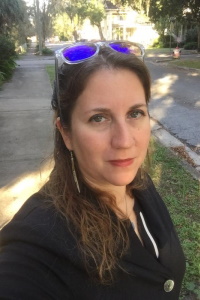
UF’s Sadie Ryan to Co-Lead NSF-Funded Institute for Emerging Virus Research
Global research team wants to be ready when viruses jump from animals to humans
As the world grapples with an onslaught of new public health threats, the need for advances in research and education around viruses becomes ever more pressing. Sadie Ryan, PhD, associate professor of medical geography at the University of Florida, will lead the charge in collaboration with a global team of scientists on a new National Science Foundation (NSF)-funded institute.
The research team will amass knowledge about viral emergence, the process of viruses jumping from animals to humans, by targeting significant sources of emerging infectious diseases. In doing so, they hope to better prepare for — or even prevent — the next global pandemic.
The Verena (Viral Emergence Research Initiative) Biology Integration Institute aims to develop a cross-disciplinary research agenda by unifying knowledge across ecology, immunology, microbiology and global change biology. The institute, based at Georgetown University’s Center for Global Health Science and Security, will harness big data and machine learning for more accurate predictions about potential threats. Verena’s open-source network, with a public database for wildlife disease surveillance, removes barriers for researchers by creating a comprehensive catalogue of data.

As climate change and habitat loss increase interactions between wildlife and humans, viruses are more likely to jump the species barrier. Vector-borne disease, human illnesses caused by parasites, will be a focus of study across the institute. The researchers will conduct exploratory studies on mosquitos as major vectors of infectious diseases, including dengue and malaria. Over the first five years of funding, the institute will also provide new insight into the evolution of bats’ immune systems.
Ryan’s research focus will encompass aspects of global change and the emergence of new host-virus interactions. “This grant allows me to extend and broaden collaborative research in zoonotic disease, primarily vector-borne disease, as well as the impacts of global change on disease emergence and spread,” Ryan said. “I’ll also be able to fund trainees to learn and apply computational methods to explore and describe emerging viral pathogen threats — from their molecular underpinnings to the global scale of their emergence and spread.”
The institute will train over 100 early-career scientists in the science of the host-virus network, as well as core scientific skills in data fluency and knowledge translation. Undergraduate students will gain an introduction to foundational concepts in an experiential research course, while graduate students and postdoctoral fellows will explore advanced methods in a workshop series. Opportunities to draw public interest, including K-12 outreach and open-source materials, will encourage the cohort to raise awareness of key issues.
“It’s really exciting to be part of a large, multi-disciplinary, multi-institutional (fully supported) integration project, in which all career stages are involved,” Ryan said. To ensure researchers worldwide can make use of the data, the institute is fully committed to a set of guiding principles called FAIR, a concerted effort to make data and all training materials “Findable, Accessible, Interoperable and Reusable.”
The project was not developed as a response to COVID-19, although the pandemic has underscored its significance. The researchers began developing their approach six months before the COVID-19 pandemic even began. They started to build datasets, run experiments and apply artificial intelligence to understand the rules of cross-species transmission. “This project leverages both novel data collection in the lab and field, and synthesis of existing data, across systems and scales, to help answer some of the large computational questions about the fundamental issues of anticipating emerging pathogens,” Ryan said.
Georgetown’s Colin Carlson, PhD, will serve as director of the Institute and co-founder of Verena. In addition to Ryan and Carlson, other grant co-lead investigators include Stephanie Seifert, PhD, Washington State University; Daniel Becker, PhD, University of Oklahoma; and Cynthia Wei, PhD, Georgetown University. The institute also includes 9 additional senior researchers.
The researchers hope to get a step ahead of disease exposure and burden by understanding patterns in viral emergence. “The days of ‘quiet periods’ between epidemics are over — from this point on, we’re headed from Covid-19 straight into monkeypox, into the next public health crisis,” Carlson said in a release from Georgetown. “Our goal is to build the data and tools we need to know what’s coming tomorrow – and maybe, actually, be ready next time.”
Learn more about this grant here.


